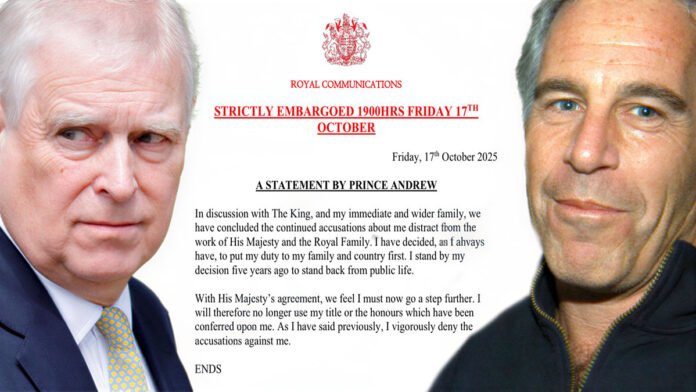Titles Gone, Privilege Intact: More Sackcloth and Ashes
Prince Andrew has surrendered his Duke of York title and his membership in the Order of the Garter. Cue the solemn palace statements. Cue the royal commentators discussing the gravity of the moment. Cue the media treating this as some kind of meaningful accountability.
It’s theatre. More sackcloth and ashes. A public spectacle Andrew and the Palace hope will be enough to make the problem go away. Again.
Because here’s what hasn’t changed: Andrew remains a Prince. He remains eighth in line to the throne. He retains his Royal Lodge residence in Windsor Great Park, a 30-room mansion he occupies rent-free courtesy of the Crown Estate. He keeps his taxpayer-funded security detail. He keeps his wealth, his connections, his comfortable existence insulated from the consequences that would destroy any ordinary person facing similar allegations.
Let us be clear about what Prince Andrew has been accused of. Virginia Giuffre alleged that she was trafficked to him by Jeffrey Epstein and Ghislaine Maxwell when she was 17 years old. She described three encounters, including one at Maxwell’s London home in 2001. Epstein, a convicted sex offender who died in prison under suspicious circumstances, ran a network of abuse that ensnared vulnerable girls and young women. Maxwell is currently serving 20 years in a US federal prison for her role in that network.
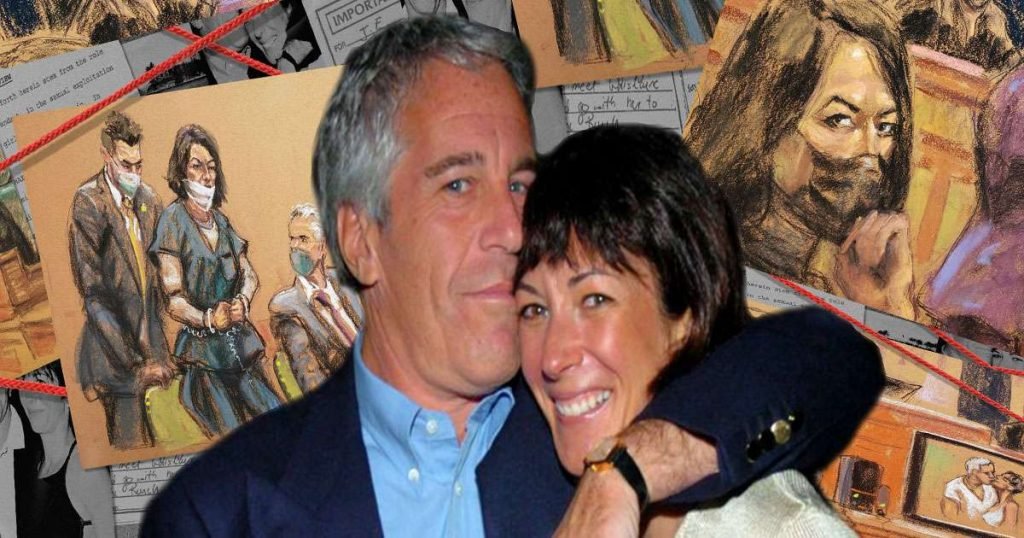
Andrew has always denied the allegations. In 2022, he reached a financial settlement with Giuffre without admitting wrongdoing. Money changed hands. Lawyers drafted carefully worded statements. The case went away. At least legally.
But morally? Morally, the questions remain. And now, tragically, Virginia Giuffre is dead. She ‘took her own life’ six months ago, her pain and trauma unresolved, her fight for accountability unfinished. This week, extracts from her posthumous memoir, Nobody’s Girl, were published in The Guardian. They place Andrew squarely within Epstein’s circle of influence, a world of immense wealth, impunity, and exploitation. Epstein, she wrote, was a “master manipulator” who used his network of powerful friends, including Andrew, to prey on vulnerable girls.
The timing of Andrew’s latest title surrender is no coincidence. It comes just days before the full publication of that memoir. The Palace is trying to get ahead of the story, to control the narrative, to demonstrate that consequences have been applied. But what consequences, exactly?

Royal commentator Robert Hardman told the BBC that whilst Andrew is presenting the move as voluntary, “it would have been made by the Palace.” He described the decision as “the culmination of several issues, his relationship with Jeffrey Epstein and also with an alleged Chinese spy. Things are simply not going away.”
Then Hardman said the quiet part out loud: “Nothing has changed constitutionally. He’s not been stripped of titles, he’s merely agreed not to use them.”
Read that again. He’s not been stripped of anything. He’s agreed not to use certain titles. It’s voluntary. Reversible. A public relations gesture dressed up as accountability. Andrew could, theoretically, start using those titles again tomorrow if he wanted to. The only thing stopping him is the Palace’s fear of bad publicity.
Compare this to how justice works for everyone else. If you’re accused of serious crimes and reach a civil settlement, you don’t get to keep your job, your reputation, your comfortable life. You face professional ruin. Social ostracism. Financial consequences that last years. If you’re convicted, you go to prison. If you’re merely accused but the allegations are credible, you lose opportunities, relationships, standing in your community.
But if you’re a prince? You give up some ceremonial titles you weren’t using anyway. You stop being called “Duke of York” in public whilst remaining a prince in private. You lose your military honours, those honorary positions that were always symbolic rather than earned. And then you retreat to your mansion and wait for the next scandal to distract the media.
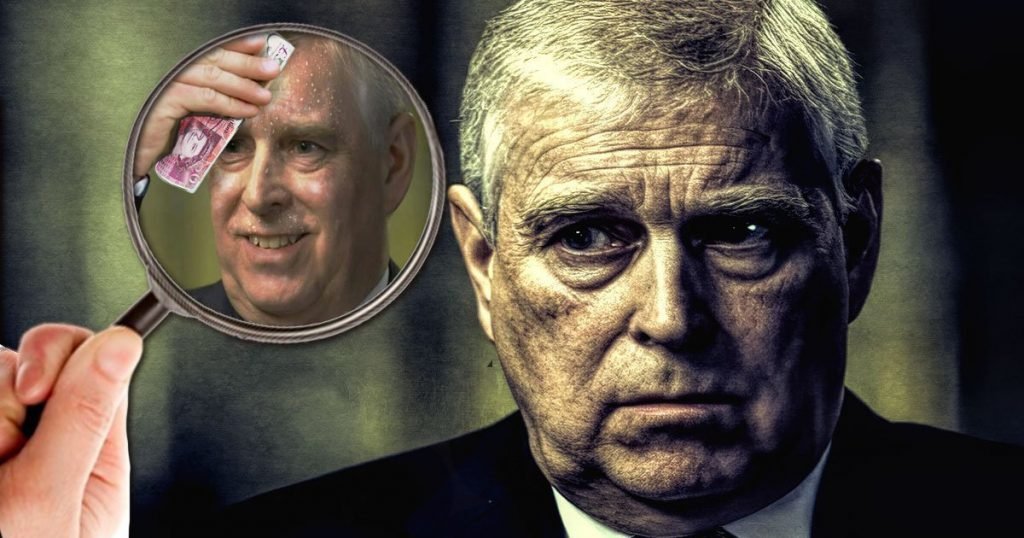
This is the two-tier justice system in its purest form. Not the imaginary two-tier policing that the far right invents to stoke division, but the real, documented, undeniable two-tier system where wealth and birth determine whether consequences apply to you.
Think about what ordinary people face for far lesser offences. A man in Sheffield was jailed for two years in 2019 for historical sexual assault allegations dating back decades. A woman in Manchester lost her teaching career over an inappropriate relationship with a sixth-form student. These people are rightly punished within the law. They face the full weight of the justice system and social condemnation.
Prince Andrew faced a civil lawsuit, paid his accuser off, and kept his palace, his wealth, his security detail, and his place in the line of succession. Now he’s giving up titles he wasn’t using, and we’re supposed to treat this as accountability.
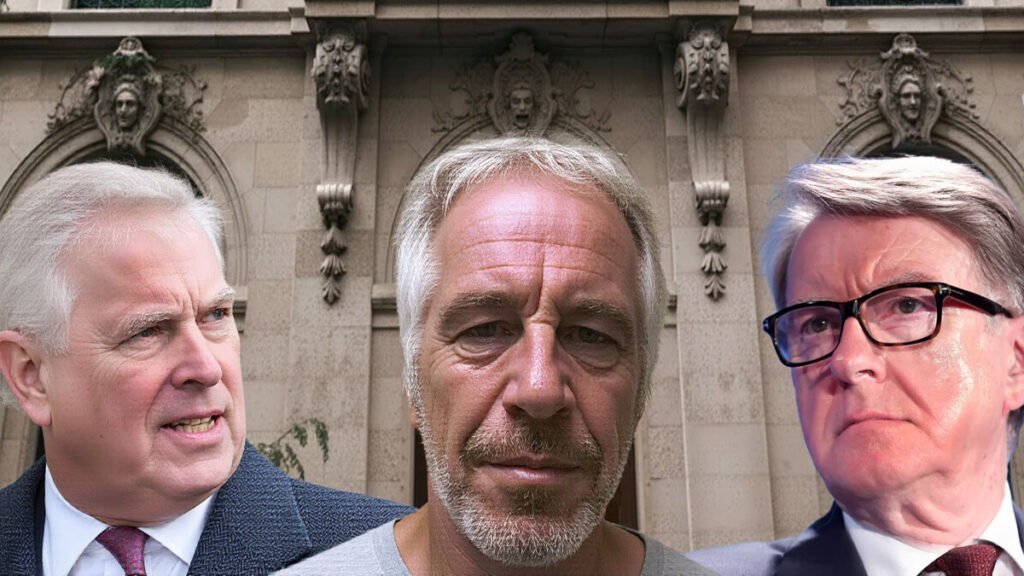
The monarchy’s complicity in protecting Andrew reveals everything you need to know about how these institutions function. When the allegations first became public, Andrew was defended. When his catastrophic BBC Newsnight interview in 2019 made that defence impossible (who can forget the Pizza Express alibi and the inability to sweat?), he was quietly moved out of public view. When the civil lawsuit threatened to embarrass the family, the late Queen Elizabeth II helped facilitate the financial settlement that made it go away.
At every stage, the priority was protecting the institution, managing the scandal, minimising the damage to the royal brand. At no stage was the priority justice for Virginia Giuffre. At no stage did anyone in that family or that institution prioritise truth and accountability over reputation management.
And now Virginia Giuffre is dead, and her memoir is being published posthumously. The woman who fought for years to hold powerful men accountable, who endured public scrutiny and legal battles and endless character assassination, who carried trauma that most of us cannot imagine, took her own life. The pain she endured, the justice she never fully received, the weight of fighting institutions designed to protect men like Andrew, it proved too much.
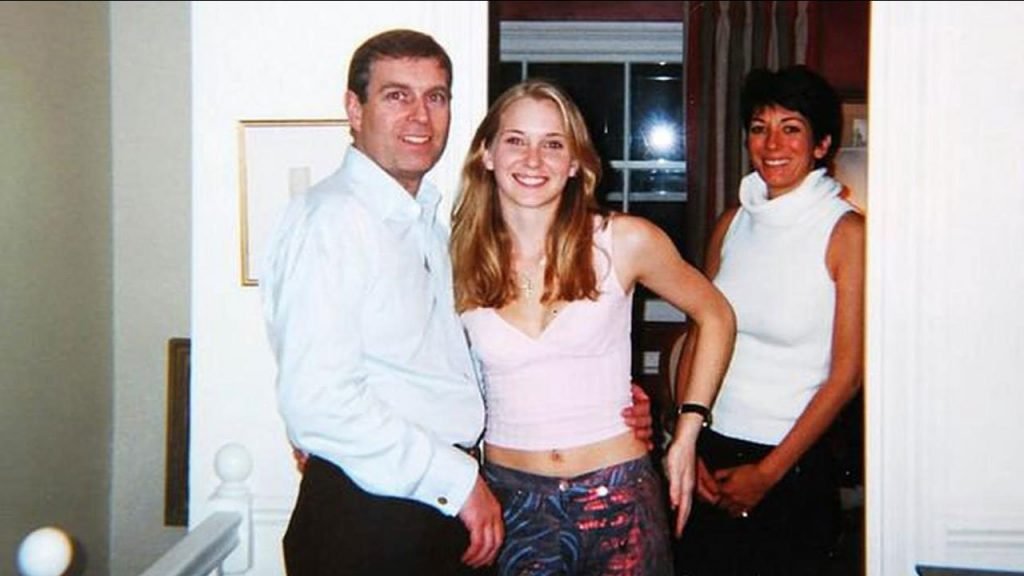
Her death should be a moment of reckoning. Instead, we get Andrew surrendering ceremonial titles three days before her book is published. It’s damage control masquerading as conscience. It’s the Palace hoping that if they throw the public enough symbolic gestures, we’ll forget to demand actual accountability.
Royal commentators will dutifully note the historic nature of giving up the Order of the Garter, one of the oldest orders of chivalry. They’ll discuss the constitutional implications. They’ll debate whether this represents sufficient punishment. They’ll treat it all with the seriousness that powerful institutions demand when dealing with their own.
But strip away the pageantry and the protocol, and you’re left with a simple truth: a man accused of serious misconduct, who settled a civil case without admitting wrongdoing, who was friends with a convicted sex offender and a convicted sex trafficker, gets to live comfortably in a mansion whilst his accuser is dead and her family buries her.
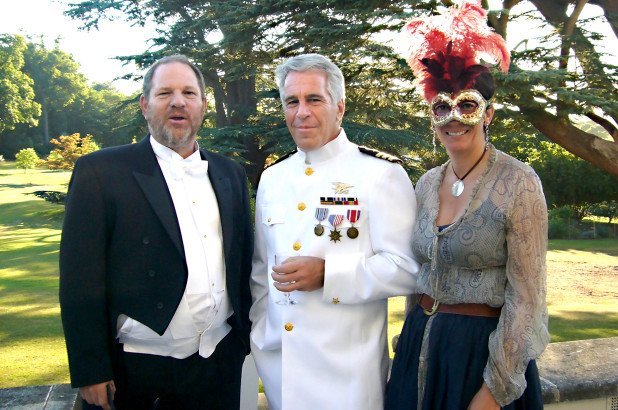
That’s not justice. That’s not accountability. That’s privilege so complete, so entrenched, so unshakeable that even the worst allegations imaginable can’t dislodge it.
Andrew’s daughters, Princess Beatrice and Princess Eugenie, retain their titles. His former wife, Sarah Ferguson, will no longer be known as the Duchess of York, though she’ll presumably survive the loss. The family remains intact, wealthy, protected. They’ll attend private gatherings, maintain their social connections, live lives of comfort that most Britons cannot imagine.
Meanwhile, what happens to the other girls and young women who were trafficked by Epstein and Maxwell? What happens to those who didn’t have the resources or courage to come forward? What happens to those who testified against Maxwell and watched as the men who abused them faced no consequences? They live with their trauma whilst their abusers live with their titles, their wealth, their freedom.
This is what class means in Britain. Not accent or education or which schools you attended. Those are markers, symptoms. The real meaning of class is whether rules apply to you. Whether consequences find you. Whether justice can touch you. For most people, the answer is yes. For Prince Andrew, the answer is no. He can lose ceremonial positions and honorary titles and still live better than 99% of the population. He can be associated with one of the worst sex trafficking scandals in modern history and still be a prince, still be in line for the throne, still be protected by the institution he was born into.
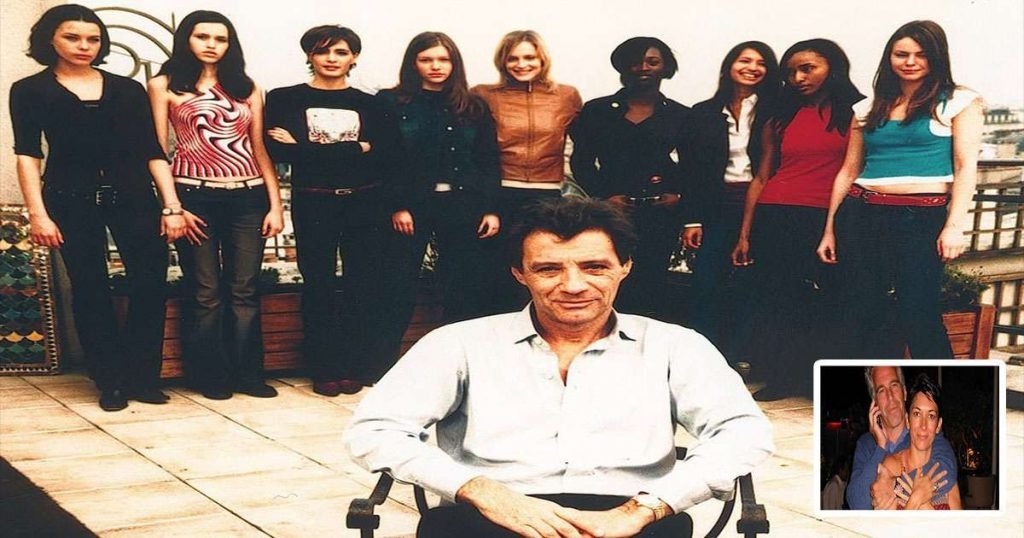
For the Palace, this latest move is an attempt to close a wound that refuses to heal. But wounds don’t heal when you only treat the surface whilst the infection remains. The monarchy’s fundamental problem is not Prince Andrew. It’s the assumption that people born into certain families deserve different treatment, different justice, different rules than everyone else.
You cannot have a democratic society and a hereditary monarchy that places some people above accountability. You cannot claim to believe in equality under law whilst maintaining institutions designed to shield the powerful from consequences. You cannot say justice matters whilst watching Andrew give up meaningless titles and call it sufficient punishment for allegations that would destroy any ordinary person.
Virginia Giuffre fought for justice and died without receiving it. Her memoir, published after her death, will tell her story in her own words. But she should have been here to tell it herself. She should have seen the men who abused her face real consequences. She should have lived to see a system that protected her instead of protecting them.
Instead, she’s dead, and Andrew is voluntarily surrendering titles he wasn’t using anyway whilst remaining a prince. If that’s the best our system can manage, then the system is designed to fail everyone except those it was built to protect.
Prince Andrew may have lost his titles, but not his privilege. In Britain’s hierarchy of scandal, shame is negotiable, but class is permanent.
Support Independent Journalism Today
Our unwavering dedication is to provide you with unbiased news, diverse perspectives, and insightful opinions. We're on a mission to ensure that those in positions of power are held accountable for their actions, but we can't do it alone. Labour Heartlands is primarily funded by me, Paul Knaggs, and by the generous contributions of readers like you. Your donations keep us going and help us uphold the principles of independent journalism. Join us in our quest for truth, transparency, and accountability – donate today and be a part of our mission!
Like everyone else, we're facing challenges, and we need your help to stay online and continue providing crucial journalism. Every contribution, no matter how small, goes a long way in helping us thrive. By becoming one of our donors, you become a vital part of our mission to uncover the truth and uphold the values of democracy.
While we maintain our independence from political affiliations, we stand united against corruption, injustice, and the erosion of free speech, truth, and democracy. We believe in the power of accurate information in a democracy, and we consider facts non-negotiable.
Your support, no matter the amount, can make a significant impact. Together, we can make a difference and continue our journey toward a more informed and just society.
Thank you for supporting Labour Heartlands
